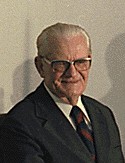- Ernesto Geisel
Infobox_President
name=Ernesto Geisel
nationality=Brazilian

term_start=March 15 ,1974
term_end=March 15 ,1979
predecessor=Emílio Garrastazú Médici
successor=João Baptista de Oliveira Figueiredo
birth_date=birth date|1907|8|3|mf=y
birth_place=Bento Gonçalves, Rio Grande do Sul
death_date=death date and age|1996|9|12|1907|8|3|mf=y
death_place=Rio de Janeiro , Rio de Janeiro
spouse=Lucy Geisel
party=National Renewal Alliance Party - ARENA
order=32ndPresident of Brazil
vicepresident=Adalberto Pereira dos Santos Ernesto Beckmann Geisel, pron. IPA2|eʁ'nɛstu 'bɛkmɐ͂ 'gajzew, (
August 3 ,1907 -September 12 ,1996 ) was aBrazil ian military leader andpolitician .Early life and family
Born in Bento Gonçalves as the son of
Lutheran Germanimmigrant s, Geisel along with his brother, Orlando (1905-1979, who would be later Minister of Army in the Médici's government), entered the army early and was the first of his class when he graduated from the Military College ofPorto Alegre in 1925. He acquired a better military knowledge as he attended theEscola Militar do Realengo , graduated, in 1928, as first in his class and could take part in the artillery as an "Aspirante". Geisel witnessed and participated in the most prominent events of Brazilian history in the 20th century, such as the revolution of 1930, theGetúlio Vargas dictatorship and the 1964 military coup d'état that overthrew the leftist PresidentJoão Goulart . In this military intervention, Geisel was an important figure and he became Military chief of Staff of PresidentHumberto de Alencar Castelo Branco . ["Ernesto Geisel." Encyclopedia of World Biography, 2nd ed. 17 Vols. Gale Research, 1998.]Also in 1964 he became Lieutenant-General and in 1966 a 4 star-General. In 1969 he was made president of
Petrobras , the state-owned oil company of Brazil.Geisel married Lucy Markus, the daughter of an army colonel, in 1940. They had a daughter, Amália Lucy (later a university professor), and a son, Orlando, from whose death in a 1957 train accident his father never completely recovered. His widow died in an automobile accident in 2000. [pt icon [http://www.terra.com.br/istoegente/32/tributo/index.htm Death notice] ]
Presidency
In 1973 Geisel was appointed by President
Emílio Garrastazu Médici and other military leaders to be the candidate of theNational Renewal Alliance Party (ARENA) for the presidency. At that time, the president of Brazil was chosen by the military and then approved by the Congress in order to give an impression of free elections. Geisel was elected by a vast majority and was inaugurated onMarch 15 ,1974 for a five-year mandate.From 1968 to 1973, the Brazilian economy grew at a rate of more than 10% per year, the fastest in the world. But due to the oil shock crisis in 1974, development fell to 5%-6% per year. Because oil had to be imported, Brazil's foreign debt began to rise.
In the early 1970s, the radical leftists were
torture d or even murdered, while the press was censored. By 1974 signals of guerrilla activities were silenced.Sensing that military rule could not be prolonged indefinitely, Geisel and his Chief of Staff, Minister
Golbery do Couto e Silva devised a plan of gradual, slow democratization that would succeed, in spite of all attempts and threats of the opposition offered by radical sectors of the military hierarchy.The military regime's main
censorship tool, the Fifth Institutional Act, which had given the government dictatorial powers, was renounced by President Geisel in the end of 1978.In his 5 years of government, Geisel adopted a more pragmatic
foreign policy . Despite being aconservative and deeplyanti-communist , Geisel made significant overtures towards the communist bloc.During Geisel's term of office, Brazil established diplomatic relations with the
People's Republic of China andAngola , signaling a growing distance betweenBrasilia andWashington . Although both countries remained allies, Geisel was keen to seek alliances and, more importantly, economic opportunities in other parts of the Globe, especially Africa and Asia.In 1978 Geisel appointed General
João Baptista de Oliveira Figueiredo as his successor. He left office onMarch 15 ,1979 .ee also
*
1964 Brazilian coup d'état
*List of Presidents of Brazil
*History of Brazil (1964-present) References
Wikimedia Foundation. 2010.
